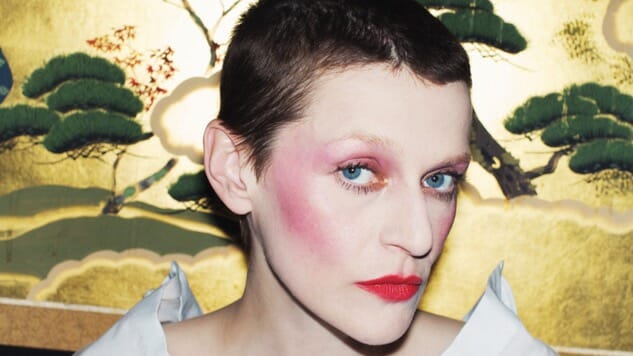Catching Up With: El Perro Del Mar

It’s been a while, but El Perro Del Mar didn’t die. When Sarah Assbring put aside her alter ego for a few years in favor of raising her son, she always knew she’d return. But a funny thing happened when the Swedish musician dusted off the project—like meeting a friend for coffee after several years apart, something had changed. In order to reconnect with music, a reinvention was in order.
This is not an usual story, nor is it unprecedented in the canon of El Perro Del Mar. Her self-titled debut introduced Assbring as a singer/songwriter with a penchant for sugary girl-group harmonies. A sophomore release From the Valley to the Stars largely eschewed pop tropes in favor of mournful chants. And both Love is Not Pop and 2012’s Pale Fire leaned on dance themes including ’90s-influenced house beats, cinematic spoken word interludes and icy synths.
KoKoro (Japanese for heart) is still recognizable as an El Perro Del Mar album. Across 10 tracks Assbring teases out a sense of blue-tinged optimism, her longing for connection, unification and change present in every moment. But now it’s not just the western world she’s aimed at. Inspired in part by her son’s childlike curiosity and a trip to one of Stockholm’s many museums, El Perro Del Mar now features sounds from across Asia, sampled instruments repurposed into a pop packages. Assbring describes her new sonic palette as an exciting discovery, and a great reminder that music—just like life—is bigger and richer than she could have ever imagined.
Paste: What was your headspace like going into this new album after a four-year break?
Assbring: I was thinking about a lot of things. Just having become a parent was a huge thing for me. It changed a lot for me in the way that I was thinking about myself, about my music, about the way that I wanted to communicate my music. I felt that immediately. I knew I wasn’t going to be able to do the introspective searching, because that’s not what I’m about anymore. I felt like I really went through a huge personal change and that would affect my music. And my songwriting as well. I think that’s what you definitely hear in KoKoro. The way that I direct myself to the world around me. I’m not so interested in digging around in my own weaknesses as much. It’s more in a universal way. What are the similarities that I have with other people with rather than what distinguishes me from the rest of the world, which is very much the way I wrote music before. That’s one of the hugest changes for me going into this album.
Paste: That’s not just an artistic change—that’s a huge life change.
Assbring: Yeah. It was, definitely. I understood that immediately. It kept growing in me as I understood what it was like to have a child. To be responsible for a life. So many existential heavy things. But also really really beautiful things as well. Cherishing your own life and cherishing life in general. I was definitely not ready for that. It came upon me as a shock, almost. It was really deep. In many ways it continues to be like that. I think of it as my life before and my life after having my child. It’s a whole other life.
Paste: I thought the “Endless Ways” refrain was mesmerizing. What has it meant for you to better yourself?
Assbring: It’s more about the idea of thinking that you’re bettering yourself. Maybe fooling yourself that is what you’re doing. The Sisyphus idea, waking up every morning and rolling that stone uphill and to wake up the next morning and see it rolled down and you have to start again. It’s a shallow bettering that’s not in the depths of what changes you. It’s the state that I feel like humans of today are very much engaged in. It’s also a thing that I feel like I have this need in me, and I feel like a lot of people do, to view life is a constant kind of bettering. You go through your life, your days, your season with a plan of becoming better, more beautiful, becoming more fit, more stable, more in harmony.
Paste: As humans can we escape that sort of vanity? Or is it our lot in life to keep rolling the boulder up the hill?
Assbring: I think it’s a part of how we are as a human being, to have that inner strife, to better ourselves. To have that plan that we live with. I guess that is what makes us human beings. Also the reason why we’re strange animals on this planet, having become what we have and done what we have.
-

-

-

-

-

-

-

-

-

-

-

-

-

-

-

-

-

-

-

-

-

-

-

-

-

-

-

-

-

-

-

-

-

-

-

-

-

-

-

-








































